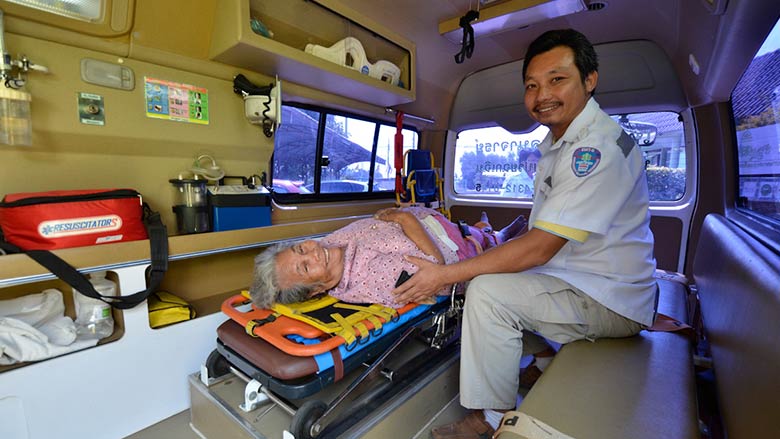The Positives Thailand Must Carry Forward From Bloomberg’s Global Health Care Efficiency Index
Thailand Medical News Jan 20, 2019 7 years, 1 month, 1 week, 20 hours, 46 minutes ago
Positive news for Thailand’s healthcare sector was highly welcome when Bloomberg released their Global Health Care Efficiency Index in the last quarter of 2018.
Thailand Medical News reviews these extremely positive results and suggest why momentum must be maintained as well as 2 challenges that must be addressed in order for this momentum to be carried forward on a continuous basis.
Biggest annual improvers:
The Kingdom took a huge upward leap in moving up the ranking index from 41
st to 27
th among 56 countries included in this prestigious survey.
The rise was in the main due to per-capita spending declining 40% to just $219 (7,000 Baht) and life expectancy also advancing to 75.1 years.
There is also no doubt that the strong emphasis on the promotion of Medical Tourism from all concerned is a powerful factor. Indeed, this is seen as one of the country’s fastest growing industries.
How does the Kingdom shape up against other countries?
While plaudits are obviously due, the Kingdom still has ground to make up on some of its Asia-Pacific neighbours. They ranked 9
th behind:
- Hong Kong
- Singapore
- South Korea
- Japan
- Australia
- Taiwan
- New Zealand
- China
In terms of the 5 top spots, these were ranked as follows:
- Hong Kong
- Singapore
- Spain
- Italy
- South Korea
Here are just 5 ‘notable’ countries that the Kingdom now stands above:
- Netherlands: 28th
- United Kingdom: 35th
- Denmark: 41st
- Germany: 45th
- USA: 54TH
Pleasing, but these advantages must be pressed home:
As mentioned, plaudits should be given where they are due, but it is crucially important that Thailand maintains this momentum in order to continually rise up these all-important health care rankings.
The signs that this will happen are extremely positive. Prime Minister Prayut Chan-o-cha expressed high satisfaction with the progress made and re-confirmed the governments commitment to its (2016-2025) - 10-year national development strategic plan that includes comprehensive strategies intended to further improve:
- Health Promotion
- Heal
th Care Services
- Health Education
- Health Research
Another key strategy this plan includes is a blueprint proposed to turn the Kingdom into a major global player in the medicine and health products sector.
World Health Organisation (WHO) praise:
The WHO regard Thailand’s national health security system as being eminently sustainable. This is in part due to its visible efforts of promoting public participation in order to raise living standards for its citizens.
Another example of WHO praise was received last year and related to the country’s now well-established initiative of providing free provision of CAPD (continuous ambulatory peritoneal dialysis) for those with kidney problems.
This initiative is now fully subsidised by the NHSO. It
involves doctors and nurses from hospitals and clinics around the country forming teams to visit patients with kidney diseases in their home in order to administer treatment.
It is estimated that over 20,000 kidney-disease patients’ country-wide are benefiting from this project and that a continuing, focused goal is that patients and family members will be taught to ‘self-treat’ by safely performing CAPD themselves.
Challenges:
While there are many positives to be seen through reforms and initiatives in Thailand’s health care system there are also huge challenges ahead.
Thailand Medical News will touch on just 2 that are currently occupying the minds of many:
Universal healthcare coverage
The achievement and implementation of the country’s universal healthcare coverage has quite rightly been seen as a major achievement. But, cracks to the system are now appearing that must be addressed.
The powers that be must form a cohesive plan which is both financially viable and does not place too heavy a burden on the private sector.
How this will be resolved remains to be seen and very little positive action is likely until after the Kingdom’s 2019 government election process has been settled.
Without doubt, one of the items at the top of these policy challenges has been raised by Viroj Tangcharoensathien - The Ministry of Public health’s Senior Advisor on International Health Policy Programs and Secretary General of the International Health Policy Program Foundation.
He quite rightly raises the issue of: How the
Thai healthcare system can identify new sources to fund and reduce non-essential outpatient elements of the healthcare package, while at the same time balance this with continuity of admission services and the treatment of chronic conditions.
The solution to this and many other issues surrounding the country’s universal healthcare coverage stability must be addressed.
The funding of elderly care:
As with every other civilised nation on earth, the costs of caring for Thailand’s elderly is set to skyrocket.
The demands and pressure put on the country’s healthcare system by its rapidly ageing population will only increase. This means that effective solutions need implementing in a very timely manner.
The World Bank estimates that around 7.5 million citizens (around 11% of the Kingdom’s population) are currently over the age of 65 years. This has more than doubled from the 5% estimate of 1996.
Statistics such as this show exactly why the importance of addressing how best to fund elderly care into the 2020’s and beyond is so crucial.
Final thoughts:
Thailand is certainly not alone in healthcare challenges, but that does not make the pill any easier to swallow.
Thankfully, there seems to be a real determination to see the country implement innovative ways to fund healthcare resources at all levels.
Shining stars should be seen as the Kingdom’s continual rise in the Medical Health Tourism sector ranking which is a prime source of revenue, and the government intention to establish Thailand as a hub of medical excellence.
